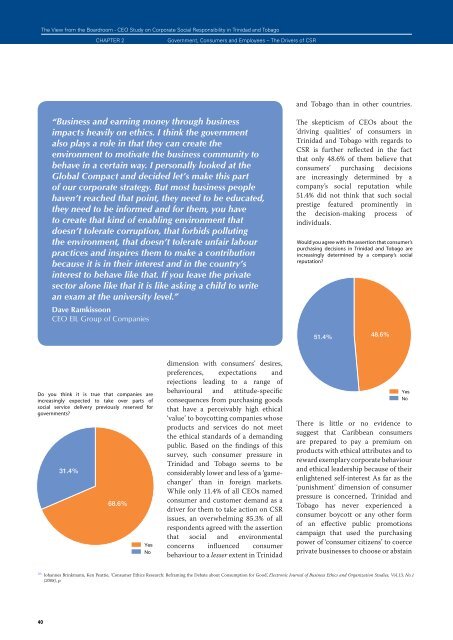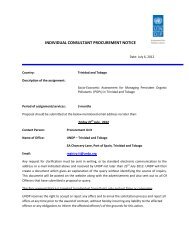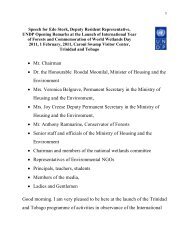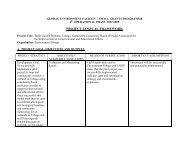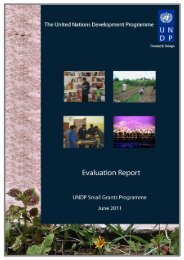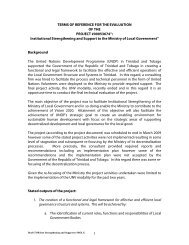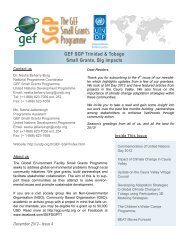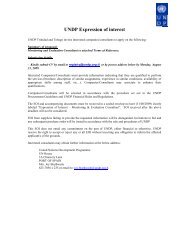The View from the Boardroom - UNDP Trinidad and Tobago
The View from the Boardroom - UNDP Trinidad and Tobago
The View from the Boardroom - UNDP Trinidad and Tobago
You also want an ePaper? Increase the reach of your titles
YUMPU automatically turns print PDFs into web optimized ePapers that Google loves.
<strong>The</strong> <strong>View</strong> <strong>from</strong> <strong>the</strong> <strong>Boardroom</strong> - CEO Study on Corporate Social Responsibility in <strong>Trinidad</strong> <strong>and</strong> <strong>Tobago</strong>CHAPTER 2Government, Consumers <strong>and</strong> Employees – <strong>The</strong> Drivers of CSR<strong>and</strong> <strong>Tobago</strong> than in o<strong>the</strong>r countries.“Business <strong>and</strong> earning money through businessimpacts heavily on ethics. I think <strong>the</strong> governmentalso plays a role in that <strong>the</strong>y can create <strong>the</strong>environment to motivate <strong>the</strong> business community tobehave in a certain way. I personally looked at <strong>the</strong>Global Compact <strong>and</strong> decided let’s make this partof our corporate strategy. But most business peoplehaven’t reached that point, <strong>the</strong>y need to be educated,<strong>the</strong>y need to be informed <strong>and</strong> for <strong>the</strong>m, you haveto create that kind of enabling environment thatdoesn’t tolerate corruption, that forbids polluting<strong>the</strong> environment, that doesn’t tolerate unfair labourpractices <strong>and</strong> inspires <strong>the</strong>m to make a contributionbecause it is in <strong>the</strong>ir interest <strong>and</strong> in <strong>the</strong> country’sinterest to behave like that. If you leave <strong>the</strong> privatesector alone like that it is like asking a child to writean exam at <strong>the</strong> university level.”Dave RamkissoonCEO EIL Group of Companies<strong>The</strong> skepticism of CEOs about <strong>the</strong>‘driving qualities’ of consumers in<strong>Trinidad</strong> <strong>and</strong> <strong>Tobago</strong> with regards toCSR is fur<strong>the</strong>r reflected in <strong>the</strong> factthat only 48.6% of <strong>the</strong>m believe thatconsumers’ purchasing decisionsare increasingly determined by acompany’s social reputation while51.4% did not think that such socialprestige featured prominently in<strong>the</strong> decision-making process ofindividuals.Would you agree with <strong>the</strong> assertion that consumer’spurchasing decisions in <strong>Trinidad</strong> <strong>and</strong> <strong>Tobago</strong> areincreasingly determined by a company’s socialreputation?51.4%48.6%Do you think it is true that companies areincreasingly expected to take over parts ofsocial service delivery previously reserved forgovernments?31.4%68.6%YesNodimension with consumers’ desires,preferences, expectations <strong>and</strong>rejections leading to a range ofbehavioural <strong>and</strong> attitude-specificconsequences <strong>from</strong> purchasing goodsthat have a perceivably high ethical‘value’ to boycotting companies whoseproducts <strong>and</strong> services do not meet<strong>the</strong> ethical st<strong>and</strong>ards of a dem<strong>and</strong>ingpublic. Based on <strong>the</strong> findings of thissurvey, such consumer pressure in<strong>Trinidad</strong> <strong>and</strong> <strong>Tobago</strong> seems to beconsiderably lower <strong>and</strong> less of a ‘gamechanger’than in foreign markets.While only 11.4% of all CEOs namedconsumer <strong>and</strong> customer dem<strong>and</strong> as adriver for <strong>the</strong>m to take action on CSRissues, an overwhelming 85.3% of allrespondents agreed with <strong>the</strong> assertionthat social <strong>and</strong> environmentalconcerns influenced consumerbehaviour to a lesser extent in <strong>Trinidad</strong>68.6%YesNo<strong>The</strong>re is little or no evidence tosuggest that Caribbean consumersare prepared to pay a premium onproducts with ethical attributes <strong>and</strong> toreward exemplary corporate behaviour<strong>and</strong> ethical leadership because of <strong>the</strong>irenlightened self-interest As far as <strong>the</strong>‘punishment’ dimension of consumerpressure is concerned, <strong>Trinidad</strong> <strong>and</strong><strong>Tobago</strong> has never experienced aconsumer boycott or any o<strong>the</strong>r formof an effective public promotionscampaign that used <strong>the</strong> purchasingpower of ‘consumer citizens’ to coerceprivate businesses to choose or abstain26 Johannes Brinkmann, Ken Peattie, ‘Consumer Ethics Research: Reframing <strong>the</strong> Debate about Consumption for Good’, Electronic Journal of Business Ethics <strong>and</strong> Organization Studies, Vol.13, No.1(2008), p.40


